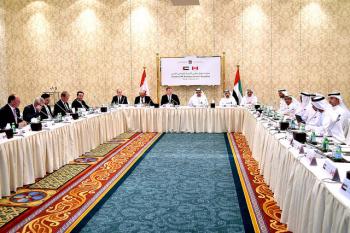Like this article? rabble is reader-supported journalism. Chip in to keep stories like these coming.
In August 2014, Salim Alaradi, a Canadian citizen of Libyan origin was arrested by Emirati state security in the lobby of his hotel where he was vacationing with his five children and wife in Dubai, United Arab Emirates (U.A.E.). His arrest wasn't unique; it happened as part of a large, sweeping arrest of 10 Libyan businessmen. Since then, four have been randomly released, two were put on trial and the last four, including Salim Alaradi, were brought to another trial.
For about three months, Salim Alaradi was kept in solitary confinement, and later was sent to Al Wathba, Abu Dhabi's most notorious prison. During his incarceration, he was never able to meet with his legal counsel or be examined by an independent medical doctor.
After 17 months in jail, Salim Alaradi was charged by the U.A.E. with supporting terrorism. The Emirati prosecution accuses him of participating in revolutionary activities in 2011, even though Libya's attorney general asserted otherwise. Despite this and despite the fact that the U.A.E. has no right to prosecute a Libyan citizen, the Emirati prosecution charged Salim Alaradi with providing financial support to, and co-operating with, terrorist groups.
Under Stephen Harper, the Canadian government kept a very low profile on this case. The Harper government didn't issue a public statement even when several human rights groups wrote a letter asking him to officially demand that Mr. Alaradi be released.
In June 2014, just a few months before Alaradi was arrested, U.A.E. Foreign Minister Sheikh Abdullah bin Zayed Al Nahyan along with his Canadian counterpart inaugurated a new consulate general in Toronto.
The U.A.E. was listed as a priority country in the Conservative government's Global Markets Action Plan, which puts commerce at the centre of Canadian foreign policy. Canadian exports to the U.A.E. reached an all-time high of $1.6 billion in 2013, making it the largest export market for Canada in the Middle East and North Africa. More than 40,000 Canadians live and work in the U.A.E., while more than 150 Canadian companies are based there. The Trudeau government emphasized a few months ago that economic cooperation continues to be the engine of Canadian relations with countries of the region.
But even while Salim Alaradi was suffering from torture and continuous detention in prison, Canada was boasting about the growing economic relationship between the two countries, especially in fields such as food and agriculture, education, oil and gas, and infrastructure.
"The relationship between Canada and the U.A.E. has never been stronger or more important to our joint prosperity. In fact, two-way trade has almost quadrupled over the past decade, increasing from $564 million in 2005 to $2.6 billion in 2014," said Arif Lalani, Canada's ambassador to the U.A.E. It is that same ambassador to Canada who went with U.S. officials to watch the extremely short court appearance of Salim Alaradi on February 15.
Tragedy mixed with comedy during that court appearance as the Emirati judge stopped Alaradi from rolling up his sleeves to show the marks of torture on his body. The judge told him to save the torture for a later hearing.
The American citizens detained with Salim Alaradi, Kamel Aldarat and his son Mohamed, seem so far to have received more interest from their U.S. government, especially after the journalist Jackson Diehl wrote an excellent piece in the Washington Post denouncing the complicit silence of the U.S. administration. The Emirati Ambassador pictured in the article was under such pressure that he was compelled to reply to the article.
Last week, Prime Minister Trudeau went to Washington to visit President Obama. Canada announced a series of issues that both countries will be co-operating on. Would the case of Salim Alaradi and those of two American-Libyan detainees benefit from this co-operation? Can Canada demand from its friends and economic partners in the United Arab Emirates that Mr. Salim Alaradi be treated with fairness and justice and be immediately released -- nothing more than what the United Nations has already stated in its opinion?
Monia Mazigh was born and raised in Tunisia and immigrated to Canada in 1991. Mazigh was catapulted onto the public stage in 2002 when her husband, Maher Arar, was deported to Syria where he was tortured and held without charge for over a year. She campaigned tirelessly for his release. Mazigh holds a PhD in finance from McGill University. In 2008, she published a memoir, Hope and Despair, about her pursuit of justice, and recently, a novel about Muslim women, Mirrors and Mirages. You can follow her on Twitter @MoniaMazigh or on her blog www.moniamazigh.com
Photo: GAC | AMC/flickr
Like this article? rabble is reader-supported journalism. Chip in to keep stories like these coming.



Comments
Do
Don't